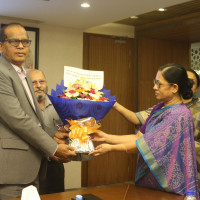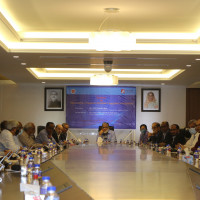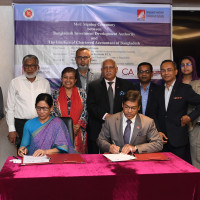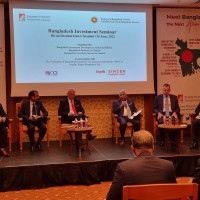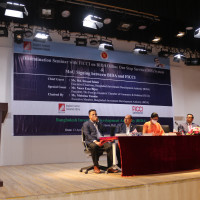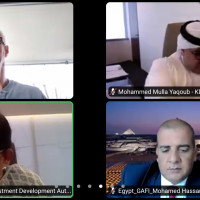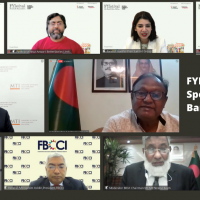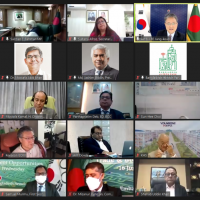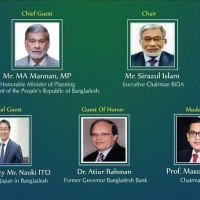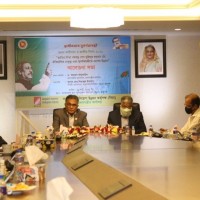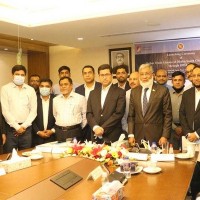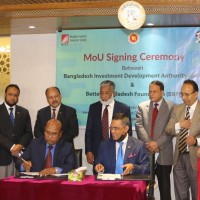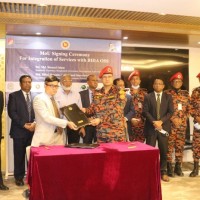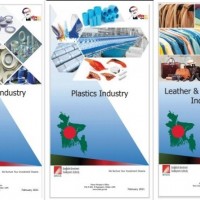Chief Adviser's Office
Investment News
200 Japanese participants join Bangladesh webinar to drive investment
May 06, 2020
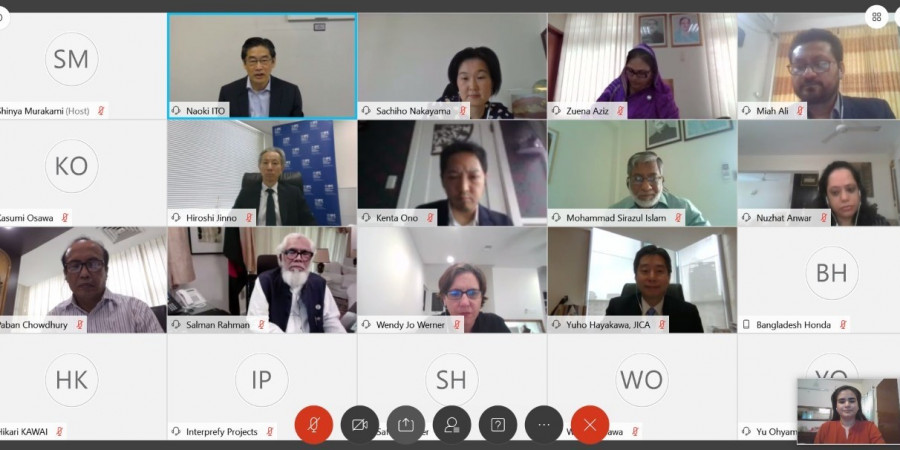
Around 200 Japanese private sector participants have joined a webinar organized by Bangladesh to attract Japanese investments.
The ‘Dialogue to Drive Japanese Investments in Bangladesh’ was jointly organized by the Prime Minister’s Office, the International Finance Corporation (IFC) and Japan International Cooperation Agency (JICA) at 11am Wednesday.
The advantages and facilities available in Bangladesh were highlighted by top policymakers and Japanese businesses already working in Bangladesh. Japan’s Sumitomo Corporation, Marubeni Corporation and Honda have actively participated in the outreach effort.
“The strength and stability of our economy and our political leadership is undoubted. We are very grateful to be considered as a destination for more Japanese investments,” said the Hon’ble Prime Minister’s Private Industry and Investment Adviser Salman Fazlur Rahman MP in his opening remarks.
He urged Japanese businesses to take advantage of Bangladesh’s high corporate profitability, business-friendly policies, massive domestic market and strategic access to key markets across the world.
His Excellency the Ambassador of Japan Ito Naoki, addressing the event, have urged Japanese investment to explore the diverse investment opportunities available in Bangladesh.
BIDA Executive Chairman Md. Sirazul Islam and BEZA Executive Chairman Paban Chowdhury addressed the plenary session and took questions from Japanese investors.
Zeuna Aziz, Principal Coordinator (SDG Affairs), Prime Minister’s Office, who heads the government’s high-powered committee to promote FDI, graced the ceremony and delivered the concluding remarks. IFC Tokyo’s Chief Investment Officer Hiroshi Jinno moderated the event.
Wendy Werner, Country Manager, IFC and Hayakawa Yuho, Chief Representative, JICA Bangladesh, joined the dialogue and discussed initiatives to support private sector in Bangladesh.
The webinar followed BIDA’s high-level meeting with His Excellency the Japan Ambassador, JICA, JETRO and JBCCI in early May, which was facilitated by the IFC.
Besides the Japanese companies and leading conglomerates, representatives of Japan’s Ministry of Economy, Trade and Industry, Ministry of Finance, Ministry of Foreign Affairs were also present.
Below are the highlights of the dialogue:
A transforming landscape
The landscape in Bangladesh will be transform in a few years with support from the Japanese government, His Excellency the Ambassador of Japan Ito Naoki told Japanese investors.
He mentioned Japan’s cooperation in the Bay of Bengal Industrial Growth Belt (BIG-B initiative), the Mass Rapid Transit project and the expansion of Dhaka’s Hazrat Shahjalal International Airport. “The Moheshkhali-Matarbari Integrated Infrastructure Development Initiative (MIDI) will be a game changer for Bangladesh,” he said.
He urged Japanese companies to explore diverse opportunities in Bangladesh and reiterated Japan’s commitment towards Bangladesh’s development in focus sectors such as agriculture, healthcare and human resource development. “The Japan government has a menu of cooperation. We will leverage that as much as possible.”
A land of profitability
Bangladesh Investment Development Authority (BIDA) Executive Chairman Md. Sirazul Islam highlighted the profitability of the Bangladesh market as found by JETRO’s survey on Asian and Oceania for two years in a row.
“Bangladesh currently has over 300 Japanese companies. In 2019 survey, 70.3% Japanese companies are willing to expand in Bangladesh, which remains the highest proportion in Asia and Oceania,” he said.
The BIDA chief discussed the initiatives being taken to improve for business climate through Doing Business reforms and the expansion of the online One Stop Service. “BIDA’s online and interoperable One Stop Service already provides 18 e-payment enabled services of three agencies. And will provide 34 more services of 15 government agencies within this year. “Under the PMO’s guidance, we are preparing an attractive package for investors.”
He discussed the government’s measures to simplify dividend and profit repatriation. Foreign companies can now access working capital loan from parent companies. “At present, we are working to further liberalize the investment regime for foreign businesses.”
On Tuesday, announcements were made by the Bangladesh Bank to allow banks and non-banking institutions to extend financial support to foreign companies against overseas guarantees. The bill-of-entry process has also been simplified through automation.
Non-stop commitment
“Our Economic Zones give you the infrastructural support you need, both on-site and off-site, at very competitive land prices compared to our neighboring countries,” said Bangladesh Economic Zones Authority (BEZA) Executive Chairman Paban Chowdhury. Japan’s 1000-acre exclusive economic zone is being developed in Araihazar Upazila of Narayanganj, which is Bangladesh’s first ever economic zone under G2G initiative.
He mentioned the fiscal and non-fiscal incentives on offer and highlighted proactive measures such as skills development centres in the Bangladeshi economic Zones. The total value of expected investment in just three of the economic zones amounts to nearly $17 billion. Of these, $8 billion will come from foreign investment in manufacturing,” he said quoting UNCTAD.
“But beyond incentives, what is also very important is our non-stop commitment, service delivery mechanism and the speed with which we respond to issues raised by investors.”
Experiences of Japanese investors
“Bangladesh is a strategic priority for Honda,” said Himihiko Katsuki, CEO and Managing Director of Bangladesh Honda, which established its factory in 2018. “Despite COVID-19, motorcycle demand has gone up. Our sales and share are both increasing. Beyond export, the potential of the Bangladeshi domestic market is too big to miss.” Marubeni Corporation, operating in Bangladesh since the 1950s, discussed its profitable ventures in textile, infrastructure and fertilizer. Marubeni General Manager Hikari Kawai highlighted the effectiveness of joint platforms such as the Japan-Bangladesh Joint Public Private Economic Dialogue and the Japan Bangladesh Society.
Marubeni Corporation, operating in Bangladesh since the 1950s, discussed its profitable ventures in textile, infrastructure and fertilizer. Marubeni General Manager Hikari Kawai highlighted the effectiveness of joint platforms such as the Japan-Bangladesh Joint Public Private Economic Dialogue and the Japan Bangladesh Society.
 “The careful attention provided to Japanese investors and quick disposal of issues cannot be expressed in numbers,” said Kenta Ono, Assistant to General Manager, Sumitomo Corporation, which is developing the Japanese Economic Zone in Araihazar. The macroeconomic stability and the diligence of Bangladeshi people cannot be understated.” He advised prospective investors to utilize BIDA and BEZA as their entry point.
“The careful attention provided to Japanese investors and quick disposal of issues cannot be expressed in numbers,” said Kenta Ono, Assistant to General Manager, Sumitomo Corporation, which is developing the Japanese Economic Zone in Araihazar. The macroeconomic stability and the diligence of Bangladeshi people cannot be understated.” He advised prospective investors to utilize BIDA and BEZA as their entry point.
 Looking forward to facilitating new projects
Looking forward to facilitating new projects
The views shared through this initiative are evidence of Bangladesh’s readiness as a market, said Zuena Aziz, Principal Coordinator (SDG Affairs), Prime Minister’s Office, in her concluding remarks.
“It was a pleasure to learn more about the experiences of Japanese businesses operating in Bangladesh. It is very exciting to listen to potential Japanese investors, whose projects we hope to facilitate. We have taken detailed note of all your suggestions and we will speedily respond and resolve all issues.”
Strong development partners
There is a special appreciation for Japanese innovation and tech-driven solutions in Bangladesh, said Wendy Werner, Country Manager, IFC (Bangladesh, Bhutan and Nepal). The ground for investment is also paved well with strong ties based on diplomacy and economic cooperation, she said. IFC will continue to support private sector development in Bangladesh, as it is one of the world’s most promising emerging markets.
 Bangladesh is not only a gateway to South Asia, but also to Southeast Asia, said JICA Bangladesh Chief Representative Hayakawa Yuho. “It is the fastest growing economy in the Asia pacific region. “We have witnessed Bangladesh’s commitment and it will be the new frontier for Japanese investment.”
Bangladesh is not only a gateway to South Asia, but also to Southeast Asia, said JICA Bangladesh Chief Representative Hayakawa Yuho. “It is the fastest growing economy in the Asia pacific region. “We have witnessed Bangladesh’s commitment and it will be the new frontier for Japanese investment.”


